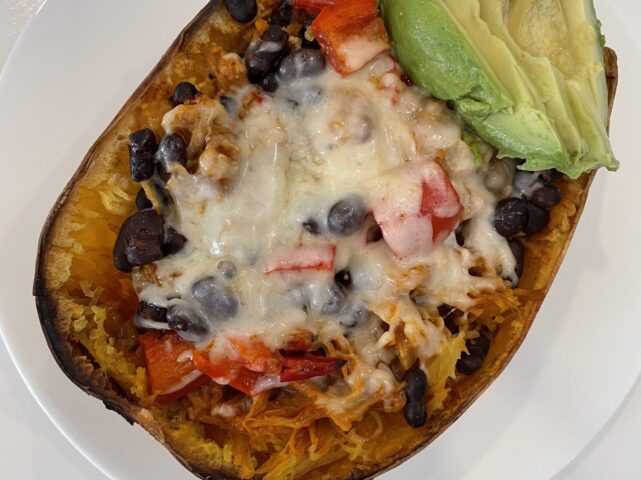Influencing Children’s Eating Habits: The Role of Parents

By Rebecca Jaspan, MPH, RD, CDN, CDCES
As a parent, your children are always observing you. Even when they are babies, they are noticing how you speak, eat, and look at yourself in the mirror. You play an important role in shaping their eating behaviors and their relationship with food and body. You also have a significant influence over the eating environment where your meals take place and the types of foods your children eat. In the first five years of life, children develop the foundation of behaviors that shape their future eating patterns.
In these early years, children learn what, when, and how much to eat based on cultural and family beliefs, attitudes, and practices surrounding food.1 Parents play a vital role in structuring these early eating experiences, which have an impact on children’s relationship with food as they get older.
Research suggests that parents’ food choices make an impact even before the child is born. Food the mother eats during pregnancy may set the stage for the baby’s acceptance of foods later in life. Flavors from the mother’s diet pass through the amniotic fluid that surrounds the fetus. One study detected smells and compounds of garlic, cumin, and curry in the amniotic fluid of pregnant women who consumed garlic capsules and spicy food.2 This research shows that fetal experience with different flavors can help familiarize the infant with a variety of different flavors and plays an important role their acceptance of different food.
The same sensory properties of amniotic fluid are seen in breast milk as well. Breast milk may help facilitate the transition to an adult diet as many flavors the mother eats are found in breast milk. One study looked at the impact of flavor in breast milk on infants’ acceptance and enjoyment of foods. In women who drank carrot juice during pregnancy, their infants’ had increased acceptance and enjoyment of carrot flavor in infant cereal.3
As children get older, their eating patterns develop in early social interactions and caregivers play an influential role. Parents are in charge of selecting the foods their children eat and they serve as models that children emulate.4 Children learn about food both through the direct experience of eating and by observing the eating behavior of others. In one study, children’s intake of new foods increased when they observed their teacher enthusiastically eating the food.5 While there is limited research on this same effect in parents, we can expect that modeling by parents would have a similar, if not stronger, influence on children’s food choices and preferences.1
Here are some tips that you can practice to positively influence your children’s eating habits:
- Serve a variety of foods to your children and model eating all foods, everything from pizza to vegetables to ice cream, pending your own food allergies, medical conditions, or dietary preferences.
- Maintain the division of responsibility that you are in charge of serving your kids and they are responsible for eating. Research shows that excessive parental control over feeding, especially restrictive feeding practices, is associated with overeating and poor self-regulation of energy intake in children.6
- Try to have regular meal and snack times and eat together as a family as often as possible.
- Speak neutrally about food and bodies rather than labeling anything as “good” or “bad”.
- Promote a positive eating experience by keeping meal conversation fun and light and speak about how delicious the food is or how it is providing nourishment.
Feeding children is certainly no easy task and the dietitians at Laura Cipullo Whole Nutrition are here for you! We can help you with tips and tricks to make meal times easy and stress-free for you and your family so you can feel confident you are setting your children up to develop a healthy relationship with food.
References:
- Savage JS, Fisher JO, Birch LL. Parental influence on eating behavior: conception to adolescence. J Law Med Ethics. 2007;35(1):22-34. doi:10.1111/j.1748-720X.2007.00111.x
- Mennella JA, Johnson A, Beauchamp GK. Garlic Ingestion by Pregnant Women Alters the Odor of Amniotic Fluid. Chemical Senses. 1995;20(2):207–209.
- Mennella JA, Coren P, Jagnow MS, Beauchamp GK. Prenatal and Postnatal Flavor Learning by Human Infants. Pediatrics. 2001;107(6):88–94
- Young EM, Fors SW, Hayes DM. Associations between Perceived Parent Behaviors and Middle School Student Fruit and Vegetable Consumption. Journal of Nutrition Education Behavior. 2004;36(1):2–8
- Hendy H. Effectiveness of Trained Peer Models to Encourage Food Acceptance in Preschool Children. Appetite. 2002;39(3):217–225
- Faith MS, Scanlon KS, Birch LL, Francis LA, Sherry B. Parent-Child Feeding Strategies and their Relationships to Child Eating and Weight Status. Obesity Research. 2004;12(11):1711–1722.







